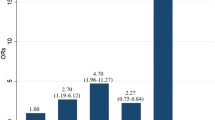Abstract
Introduction
In this study, we investigated the association between metabolic syndrome and the prognosis of idiopathic sudden sensorineural hearing loss.
Methods
In this prospective cohort study, 79 patients with idiopathic SSNHL admitted to the ENT ward were involved. Patients were under treatment with two-dose pulse methylprednisolone and then oral corticosteroid (Prednisolone 1 mg/kg for up to 2 weeks and more). In all patients, the mean hearing threshold was measured before treatment and 3 weeks after the treatment. Metabolic syndrome criteria were assessed in all patients too. Then, based on these diagnostic criteria all data in patients with and without metabolic were compared.
Results
There was a significant difference in Hypertension, BMI > 25, high TG and low HDL (p.v = 0.001) between two groups (metabolic syndrome group and non-metabolic syndrome group). The rate of recovered patients was significantly lower in the metabolic syndrome group than in the non-metabolic syndrome group (p.v = 0.001). It was found that metabolic syndrome (OR = 2.02), diabetes mellitus (OR = 7.32), HTN (OR = 4.09), BMI > 25 (OR = 3.24) and high initial hearing threshold (OR = 3.96) were clearly related to the poor prognosis of treatment.
Conclusions
According to the findings of this study, it was found that metabolic syndrome had a negative effect on hearing improvement in patients with idiopathic SSNHL.
Similar content being viewed by others
References
Chien C-Y, Tai S-Y, Wang L-F, Hsi E, Chang N-C, Wu M-T et al (2015) Metabolic syndrome increases the risk of sudden sensorineural hearing loss in Taiwan: a case-control study. Otolaryngol-Head and Neck Surg 153(1):105–111
Zedan AM (2019) Sudden sensorineural hearing loss in adults. BMJ 364:l755. https://doi.org/10.1136/bmj.l755
Zhang Y, Jiang Q, Wu X, Xie S, Feng Y, Sun H (2019) The influence of metabolic syndrome on the prognosis of idiopathic sudden sensorineural hearing loss. Otol Neurotol 40(8):994–997
Zhou Y, Qiu S, Liu D (2019) Impact of metabolic syndrome on recovery of idiopathic sudden sensorineural hearing loss. Am J Otolaryngol 40(4):573–576
Zhang X, Weng Y, Xu Y, Xiong H, Liang M, Zheng Y, Ou Y (2019) Selected blood inflammatory and metabolic parameters predicted successive bilateral sudden sensorineural hearing loss. Dis Markers 2019:7165257. https://doi.org/10.1155/2019/7165257
Singh A, Irugu DVK (2020) Sudden sensorineural hearing loss–A contemporary review of management issues. Journal of Otology 15(2):67–73
Swarup S, Goyal A, Grigorova Y, Zeltser R (2021) Metabolic syndrome. StatPearls [internet]. StatPearls Publishing
Jung SY, Shim HS, Hah YM, Kim SH, Yeo SG (2018) Association of metabolic syndrome with sudden sensorineural hearing loss. JAMA Otolaryngol-Head Neck Surg 144(4):308–314
Lin CF, Lee KJ, Yu SS, Lin YS (2016) Effect of comorbid diabetes and hypercholesterolemia on the prognosis of idiopathic sudden sensorineural hearing loss. Laryngoscope 126(1):142–149
Mosnier I, Stepanian A, Baron G, Bodenez C, Robier A, Meyer B et al (2011) Cardiovascular and thromboembolic risk factors in idiopathic sudden sensorineural hearing loss: a case-control study. Audiol Neurotol 16(1):55–66
Lin S-W, Lin Y-S, Weng S-F, Chou C-W (2012) Risk of developing sudden sensorineural hearing loss in diabetic patients: a population-based cohort study. Otol Neurotol 33(9):1482–1488
Hwang JH, Hsu CJ, Liu TC, Yang WS (2011) Association of plasma adiponectin levels with hearing thresholds in adults. Clin Endocrinol 75(5):614–620
Hwang J-H (2015) Role of obesity on the prognosis of sudden sensorineural hearing loss in adults. Otolaryngol-Head Neck Surg 153(2):251–256
Rosmond R (2002) The glucocorticoid receptor gene and its association to metabolic syndrome. Obes Res 10(10):1078–1086
Whorwood CB, Donovan SJ, Flanagan D, Phillips DI, Byrne CD (2002) Increased glucocorticoid receptor expression in human skeletal muscle cells may contribute to the pathogenesis of the metabolic syndrome. Diabetes 51(4):1066–1075
Savas M, Wester VL, Van Der Voorn B, Iyer AM, Koper JW, Van Den Akker EL et al (2021) Anthropometrics and metabolic syndrome in relation to glucocorticoid receptor polymorphisms in corticosteroid users. Neuroendocrinology 111(11):1121–1129
Xie S, Qiang Q, Mei L, He C, Feng Y, Sun H et al (2018) Multivariate analysis of prognostic factors for idiopathic sudden sensorineural hearing loss treated with adjuvant hyperbaric oxygen therapy. Eur Arch Otorhinolaryngol 275(1):47–51
Jo S-Y, Lee S, Eom T-H, Jeun E-S, Cho H-H, Cho Y-B (2015) Outcomes of severe to profound idiopathic sudden sensorineural hearing loss. Clin Exp Otorhinolaryngol 8(3):206–210
Otolaryngology-Head J (2018) Individual Sign In. JAMA 144(11):957
Bai X, Chen S, Xu K, Jin Y, Niu X, Xie L et al (2021) N-Acetylcysteine combined with dexamethasone treatment improves sudden sensorineural hearing loss and attenuates hair cell death caused by ROS stress. Front Cell Dev Biol 9:659486
Author information
Authors and Affiliations
Corresponding author
Ethics declarations
Conflict of interest
The authors have no conflicts of interest.
Ethical approval
Study protocol was in accordance with the latest Declaration of Helsinki for medical research involving human subjects and was approved by the local ethics committee.
Human and animal rights
This article does not contain any studies with animals performed by any of the authors.
Informed consent
Informed consent was obtained from all participants of the study.
Additional information
Publisher's Note
Springer Nature remains neutral with regard to jurisdictional claims in published maps and institutional affiliations.
Rights and permissions
Springer Nature or its licensor holds exclusive rights to this article under a publishing agreement with the author(s) or other rightsholder(s); author self-archiving of the accepted manuscript version of this article is solely governed by the terms of such publishing agreement and applicable law.
About this article
Cite this article
Zand, V., Dadgarnia, M., Baradaranfar, M. et al. The association between metabolic syndrome and the prognosis of idiopathic sudden sensorineural hearing loss. Eur Arch Otorhinolaryngol 280, 1411–1415 (2023). https://doi.org/10.1007/s00405-022-07686-z
Received:
Accepted:
Published:
Issue Date:
DOI: https://doi.org/10.1007/s00405-022-07686-z




